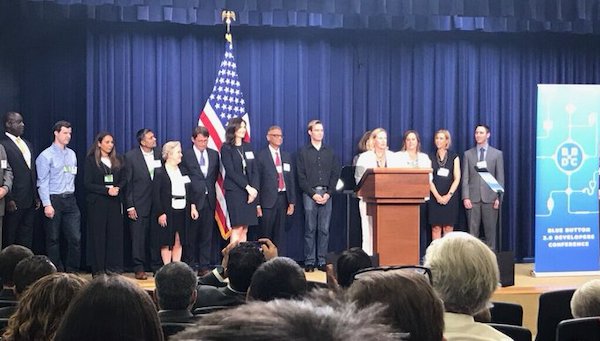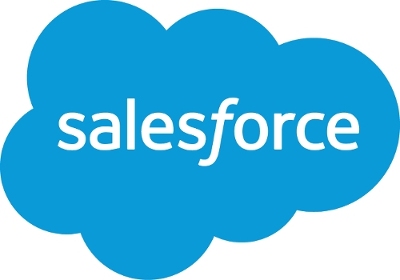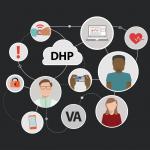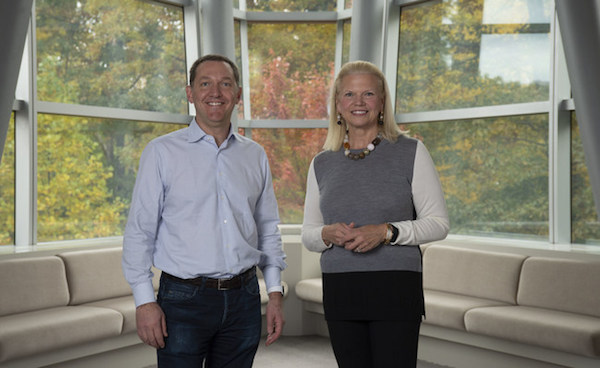MuleSoft
See the following -
Cloud Providers Reaffirm Commitment to Open Healthcare Interoperability During 2019 Blue Button Developers Conference
 As healthcare evolves across the globe, so does our ability to improve the health and wellness of communities. Patients, providers, and health plans are striving for more value-based care, more engaging user experiences, and broader application of machine learning to assist clinicians in diagnosis and patient care. Too often, however, patient data are inconsistently formatted, incomplete, unavailable, or missing - which can limit access to the best possible care. Equipping patients and caregivers with information and insights derived from raw data has the potential to yield significantly better outcomes. But without a robust network of clinical information, even the best people and technology may not reach their potential...
As healthcare evolves across the globe, so does our ability to improve the health and wellness of communities. Patients, providers, and health plans are striving for more value-based care, more engaging user experiences, and broader application of machine learning to assist clinicians in diagnosis and patient care. Too often, however, patient data are inconsistently formatted, incomplete, unavailable, or missing - which can limit access to the best possible care. Equipping patients and caregivers with information and insights derived from raw data has the potential to yield significantly better outcomes. But without a robust network of clinical information, even the best people and technology may not reach their potential...
- Login to post comments
Docker And The Rise Of Open Source
There’s never been a phenomenon like Docker. Eighteen months ago, the company took its core technology, which enables IT people to move software easily between different machines by enclosing it in “containers”, and made it open source...
- Login to post comments
Healthcare API Market Worth US$ 234 Million by 2024
 Market Research Engine has published a new report titled as “Healthcare API Market By Services (Remote Patient Monitoring, Electronic Health Record Access, Payment, Medical Device (Wearable), Appointments,); By Deployment Model (On-premise, Cloud-based); By End-Users (Healthcare Providers, Patients, Healthcare Payers, Vendors) - Global Industry Analysis and Forecast 2016 - 2024” The healthcare API market is expected to exceed more than US$ 234 million by 2024; Growing at a CAGR of more than 4% in the given forecast period....
Market Research Engine has published a new report titled as “Healthcare API Market By Services (Remote Patient Monitoring, Electronic Health Record Access, Payment, Medical Device (Wearable), Appointments,); By Deployment Model (On-premise, Cloud-based); By End-Users (Healthcare Providers, Patients, Healthcare Payers, Vendors) - Global Industry Analysis and Forecast 2016 - 2024” The healthcare API market is expected to exceed more than US$ 234 million by 2024; Growing at a CAGR of more than 4% in the given forecast period....
- Login to post comments
HIMSS17 - Open Health Guide to the HIMSS Conference in Orlando
 The HIMSS17 Conference taking place in Orlando, FL, is clearly the turning point for open source in the healthcare information technology industry. Although the label "open source" is barely mentioned in the program, the fact is the majority of the presentations at the conference are either based directly on open source technologies or open health concepts. These include the large number of presentations on interoperability, FHIR, and the open/modular Medicaid IT revolution.
The HIMSS17 Conference taking place in Orlando, FL, is clearly the turning point for open source in the healthcare information technology industry. Although the label "open source" is barely mentioned in the program, the fact is the majority of the presentations at the conference are either based directly on open source technologies or open health concepts. These include the large number of presentations on interoperability, FHIR, and the open/modular Medicaid IT revolution.
- The Future Is Open
- Login to post comments
MuleSoft
MuleSoft provides the most widely used integration platform for connecting any application, data source or API, whether in the cloud or on-premises. With Anypoint Platform®, MuleSoft delivers a complete integration experience built on proven open source technology, eliminating the pain and cost of point-to-point integration. Anypoint Platform includes CloudHub™ iPaaS, Mule ESB™, and a unified solution for API management™, design and publishing.
- Login to post comments
MuleSoft Joins Linux Foundation Open API Initiative to Accelerate Innovation in API Specifications
 MuleSoft, provider of the leading platform for building application networks, today announced that MuleSoft has joined the Open API Initiative (OAI) guided by the Linux Foundation. In addition, MuleSoft CTO Uri Sarid, creator of the open RESTful API Modeling Language (RAML) for API specification, will participate in the Technical Developer Committee to help steer OAI technologies. OAI's ability to drive a connected global economy with APIs founded on top of an OpenAPI Specification (OAS) will be enhanced by the addition of MuleSoft...
MuleSoft, provider of the leading platform for building application networks, today announced that MuleSoft has joined the Open API Initiative (OAI) guided by the Linux Foundation. In addition, MuleSoft CTO Uri Sarid, creator of the open RESTful API Modeling Language (RAML) for API specification, will participate in the Technical Developer Committee to help steer OAI technologies. OAI's ability to drive a connected global economy with APIs founded on top of an OpenAPI Specification (OAS) will be enhanced by the addition of MuleSoft...
- Login to post comments
Open Source Goes Corporate: Can Open Healthcare Be Far Behind?
 If you aren't in IT, you may have missed the news that IBM is acquiring Red Hat, a leader in the open source Linux movement, or that, a couple days prior, Microsoft closed on its acquisition of GitHub, a leader in open source software development. Earlier this year Salesforce acquired Mulesoft, and Cloudera and Hortonworks merged; all were other open source leaders. I must confess, I had never heard of some of these companies, but I'm starting to believe what MarketWatch said following the IBM announcement: "open source has truly arrived." What exactly that means, especially for healthcare, I'm not sure, but it's worth exploring. IBM is paying $34b for Red Hat.
If you aren't in IT, you may have missed the news that IBM is acquiring Red Hat, a leader in the open source Linux movement, or that, a couple days prior, Microsoft closed on its acquisition of GitHub, a leader in open source software development. Earlier this year Salesforce acquired Mulesoft, and Cloudera and Hortonworks merged; all were other open source leaders. I must confess, I had never heard of some of these companies, but I'm starting to believe what MarketWatch said following the IBM announcement: "open source has truly arrived." What exactly that means, especially for healthcare, I'm not sure, but it's worth exploring. IBM is paying $34b for Red Hat.
- Login to post comments
Salesforce Introduces Salesforce Health Cloud -- Building Patient Relationships, Not Records
 Salesforce...today introduced Salesforce Health Cloud, empowering healthcare providers to go beyond health records and build stronger relationships with patients. Salesforce Health Cloud is a cloud-based patient relationship management solution that enables providers to gain a complete view of the patient with integrated data from electronic medical records (EMRs), wearables and more; make smarter care decisions; engage with patients across their caregiver networks; and manage patient data.
Salesforce...today introduced Salesforce Health Cloud, empowering healthcare providers to go beyond health records and build stronger relationships with patients. Salesforce Health Cloud is a cloud-based patient relationship management solution that enables providers to gain a complete view of the patient with integrated data from electronic medical records (EMRs), wearables and more; make smarter care decisions; engage with patients across their caregiver networks; and manage patient data.
- Login to post comments
Team Demonstrates Digital Health Platform for Department of Veterans Affairs
 “Liberate the data.” That was a principal design goal for a team of public-private health care technology collaborators established by the U.S. Department of Veterans Affairs and Veterans Health Administration to develop a working and scalable proof-of-concept digital health platform (DHP) to support the department’s long-term vision. The open-source project demonstrated both proven and emerging technologies for interoperability and advanced functionality innovations from both the public and private sectors...
“Liberate the data.” That was a principal design goal for a team of public-private health care technology collaborators established by the U.S. Department of Veterans Affairs and Veterans Health Administration to develop a working and scalable proof-of-concept digital health platform (DHP) to support the department’s long-term vision. The open-source project demonstrated both proven and emerging technologies for interoperability and advanced functionality innovations from both the public and private sectors...
- Login to post comments
Veterans Health Administration Thinks Key to Interoperability May Be in the Cloud
 The giant Veterans Health Administration is poking its head into the cloud to see if therein lies the key to sharing data within and outside of its sprawling healthcare delivery system. The goal of the Digital Health Platform is to pull patient data from the VA, military and commercial electronic health record systems, applications, devices and wearables and send it to a patient's healthcare team in real-time. That would allow patients to more easily obtain health care from physicians and hospitals outside of VA facilities, but some experts say a cloud-based platform also leaves it vulnerable to hackers...
The giant Veterans Health Administration is poking its head into the cloud to see if therein lies the key to sharing data within and outside of its sprawling healthcare delivery system. The goal of the Digital Health Platform is to pull patient data from the VA, military and commercial electronic health record systems, applications, devices and wearables and send it to a patient's healthcare team in real-time. That would allow patients to more easily obtain health care from physicians and hospitals outside of VA facilities, but some experts say a cloud-based platform also leaves it vulnerable to hackers...
- Login to post comments
Why 2018 Was a Breakout Year for Open Source Deals
 At the beginning of 2018, it didn't seem like the open source movement could get any bigger. Android, the world's most popular mobile operating system; websites including Facebook and Wikipedia; and a growing number of gadgets have open source software under the hood-literally, in the case of cars. The world's largest companies, including Walmart and JP Morgan Chase, not only use open source but have released their own open source software so the rest of the world can modify and share their code. Then, in June, Microsoft announced plans to buy GitHub, the platform used by millions of developers and companies, including Google and Walmart, to host popular open source projects, for $7.5 billion.
At the beginning of 2018, it didn't seem like the open source movement could get any bigger. Android, the world's most popular mobile operating system; websites including Facebook and Wikipedia; and a growing number of gadgets have open source software under the hood-literally, in the case of cars. The world's largest companies, including Walmart and JP Morgan Chase, not only use open source but have released their own open source software so the rest of the world can modify and share their code. Then, in June, Microsoft announced plans to buy GitHub, the platform used by millions of developers and companies, including Google and Walmart, to host popular open source projects, for $7.5 billion.
- Login to post comments